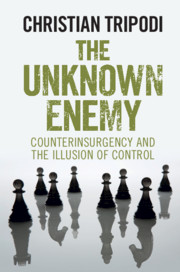Book contents
- The Unknown Enemy
- The Unknown Enemy
- Copyright page
- Dedication
- Contents
- Preface
- Acknowledgements
- 1 Culture Warriors
- 2 Themes and Issues
- 3 Knowledge, Influence and Control
- 4 ‘Peaceful Penetration’ on the North-West Frontier, 1919–39
- 5 ‘Hearts and Minds’ vs French Revolutionary War: Algeria 1954–62
- 6 Pacification in Vietnam 1964–72
- 7 Political Warfare in Iraq: Al Anbar and Basra, 2006–9
- 8 Political Warfare in Afghanistan: Helmand Province, 2006–12
- 9 Conclusion
- Bibliography
- Notes
- Index
8 - Political Warfare in Afghanistan: Helmand Province, 2006–12
Published online by Cambridge University Press: 06 November 2020
- The Unknown Enemy
- The Unknown Enemy
- Copyright page
- Dedication
- Contents
- Preface
- Acknowledgements
- 1 Culture Warriors
- 2 Themes and Issues
- 3 Knowledge, Influence and Control
- 4 ‘Peaceful Penetration’ on the North-West Frontier, 1919–39
- 5 ‘Hearts and Minds’ vs French Revolutionary War: Algeria 1954–62
- 6 Pacification in Vietnam 1964–72
- 7 Political Warfare in Iraq: Al Anbar and Basra, 2006–9
- 8 Political Warfare in Afghanistan: Helmand Province, 2006–12
- 9 Conclusion
- Bibliography
- Notes
- Index
Summary
The title of Theo Farrell’s excellent recent work – Unwinnable: The British Campaign in Afghanistan 2001–14 – sums up the NATO campaign in Helmand in suitably blunt terms.2 Responsibility for this unfortunate state of affairs, argues Farrell, lay at the hands of a number of seemingly insurmountable obstacles. Endemic corruption on the part of the Afghan government which denied it the legitimacy required to displace public support for the Taliban insurgency was one. The proximity of Pakistan, which allowed its Taliban clients the time and space to regroup and direct their campaign largely free from interference, was another. And then of course there was the Western public’s tiring of the war which eventually in 2010 led to NATO politicians setting a deadline to end the ISAF presence in Afghanistan by 2014 (an aspiration that was inevitably derailed). When compounded by what Farrell saw as the final critical weakness, namely a fundamental inability on the part of Western actors to properly understand the conflict dynamics at play in Helmand, coalition success became impossible. Farrell’s diagnosis of these fundamental causes of failure, particularly those relating to Afghan government corruption, the support provided to the Taliban by Pakistan, and Western public fatigue with a seemingly unending war, are supported by numerous other analyses.
- Type
- Chapter
- Information
- The Unknown EnemyCounterinsurgency and the Illusion of Control, pp. 165 - 195Publisher: Cambridge University PressPrint publication year: 2020



